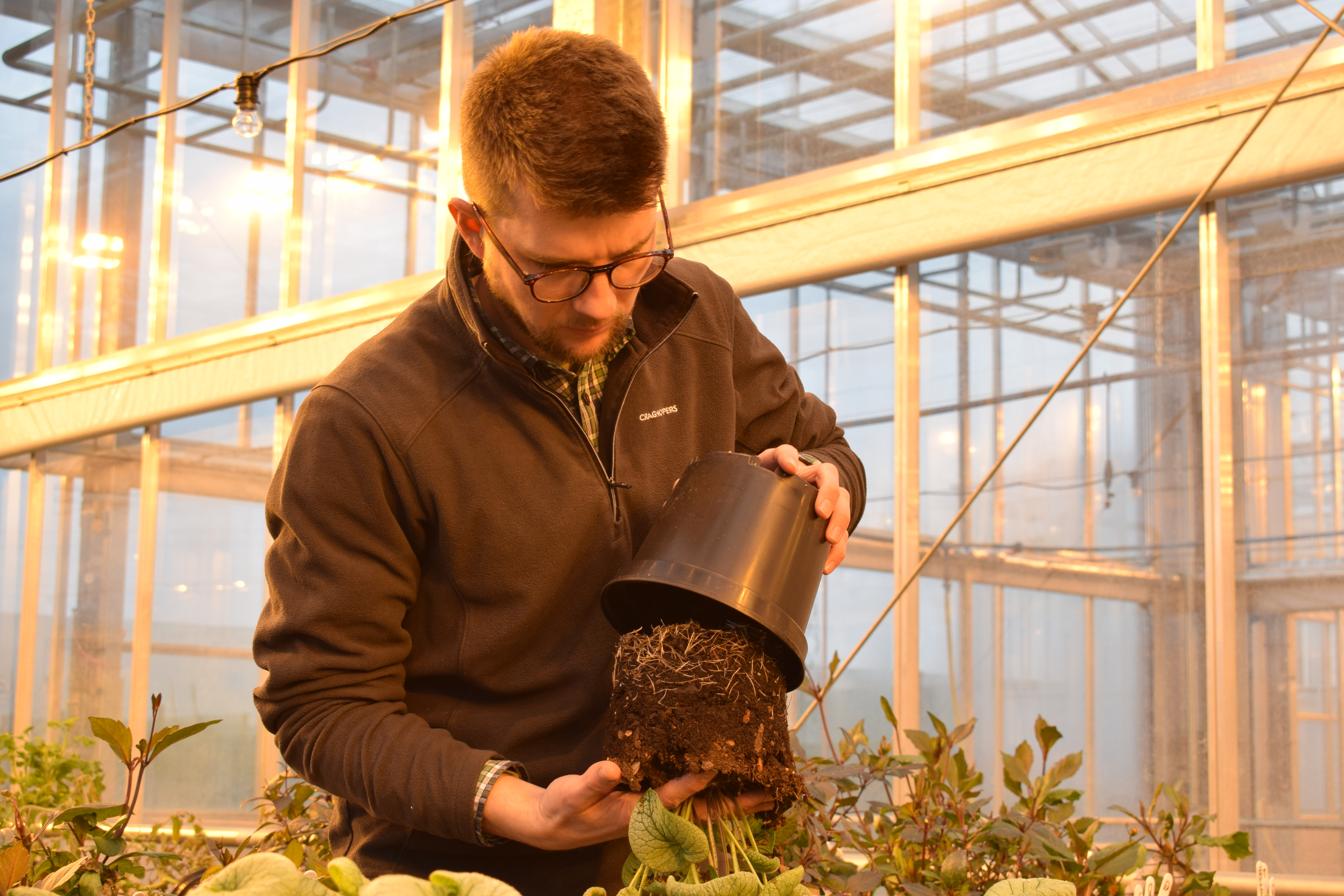
The world of horticulture and landscaping is fast-moving, ever-changing and leading the way in combatting climate change.
Growing and harvesting plants for financial, environmental or social benefits not only helps the environment, it can also boost wellbeing – and from lawn mowing to landscaping, greenkeeping to scientific research, horticulture offers a huge range of rewarding careers.
Humans have been been growing plants and maintaining the natural environment since ancient times and horticulture has never stopped changing and adapting. As we learn more about the impact of climate change and weather extremes, horticulturalists are dealing with some of the biggest issues of the day: what will we plant in the future if resources like water and nutrients become limited? How do we make the most of the rapid advances in growing techniques, machinery, and cultivation?
Horticulture and landscaping plays an important part in our economy. It’s a dynamic industry, with continuous research and development and a focus on using technology to make growing more sustainable. That has created a range of exciting job opportunities for people who are passionate about plants, science and growing solutions.
The UK horticulture industry is worth over £9 billion each year
The industry supports the employment of almost 340,000 people, with landscapers and retailers accounting for 83% of the total
Private gardening is an important activity for UK citizens, with households spending £7.5bn on gardening goods, including cut-flowers, a year
The Republic of Ireland's horticulture industry is valued at €477m; it is the fourth largest industry after dairy, beef and pigs in terms of gross agricultural commodity output value
The industry employs approximately 17,000 people in the Republic of Ireland - an estimated 6,600 people directly employed full-time and another 11,000 indirectly employed in value-added and downstream businesses
There are a wide range of diverse career opportunities available to you in the Horticulture & Landscaping sector.
Horticulture & Landscaping
Horticulture & Landscaping
Horticulture & Landscaping
Daisy Wright is a Grounds Maintenance Officer at Harmeny School in Balerno, which offers therapeutic care and education to young people aged 5-18 years. She changed career in her thirties by taking part in a Modern Apprenticeship and now loves her job in horticulture, working outdoors being physical with her hands in the soil!
Meet Ben, a technical manager at the Park Farm Site for the National Institute of Agricultural Botany (NIAB) in Cambridge, where he has been contributing his expertise since 2017. In this Q&A session, we delve into Ben's role and journey into the field of Horticulture.
What does the business do?
NIAB is the fastest-growing crop science group in the country and is at the forefront of the application of genetics, physiology, soil science, precision agronomy and, data science to improve the yield, efficiency, and resilience of crop production across the arable, forage and horticulture sectors.
What do you do in your job each day?
As part of the wider glasshouse team, my work is primarily based in and around NIAB’s park farm glasshouse facility where we grow several different plants in our 18 environmentally controlled compartments. Crops you would typically find growing in the fields across the UK and even non-natives are grown for a range of projects. My role as Technical Manager is primarily agronomy, so working out how to grow unusual or broadacre crops under glass. My current role varies depending on the season and the projects I’m working on.
My role also includes developing commercial businesses. Having a commercial growing background allows me to work between commercial and research which helps guide new businesses with project proposals.
What courses or qualifications have you completed?
Having a commercial horticultural background, I thought I was very knowledgeable in my area, but I didn’t have any recognised qualifications in the industry. Commercial horticulture wasn’t something I trained to do, I never had a direction growing up, I just knew that I wanted to work the land, be around tractors and, drive an old Land Rover!
As my love for the industry grew and I began to see a future I knew that I needed to develop my skills and attend training courses. Having funded myself to attend pesticide application training and having trained to drive a counterbalance forklift truck, I felt my experience and training were enough for me to be desirable to other businesses and develop my career.
Since joining NIAB I have been fortunate to have had the company’s backing for several in-house and external training courses including another pesticide training course, telehandler training as well as BASIS Commercial Hort and FACTs Hort. I have also undertaken management, manual handling, and health & safety training in-house.
What skills do you use in your job?
As a grower, your primary concern is always the health of the crop. You’re always on the lookout for pests and diseases and constantly working to produce a better crop. You’re constantly asking yourself, how can I increase yield, and how can I reduce my cost, my staff inputs, and my carbon footprint. As a grower and from what I learned during my training is that, an eye for detail and continuous development lead to improved processes. Integrated Pest Management (IPM) is the perfect ideology for the grower, looking at everything, and how can I make changes and improvements to help me further down the line. Training and personal development are crucial to spotting problems in a crop. Being able to spot pest damage or early signs of disease or deficiencies is critical and understanding how to combat and prevent them leads to healthier crops.
What’s the best thing about your job?
Your focus as a commercial grower is to help build a thriving business, to make money by producing a saleable crop. Working in research, I’m able to work on projects that have a real-world impact, to assist growers improve processes and transfer research into usable skills and knowledge. Perhaps the biggest “buzz” I get is from the knowledge transfer side of our work. It’s been a long journey to acquire the knowledge I have, and that should be shared with younger growers. My aim next year is to ensure NIAB hosts at least one knowledge exchange seminar in person, aimed at the younger growers looking to develop their skills.
Have you had to deal with any challenges in your career?
I suppose career progression and diversity, were the biggest limiting factors to my professional development. Being able to attend training courses and knowledge exchange seminars wasn’t something I was presented with very often. Learning my trade in a small business allowed me to build practical skills and develop procedures, but external training would have been beneficial earlier in my career.
Is there anything you are particularly proud of?
Passing BASIS Hort, during the COVID lockdowns of 2020 was the proudest I’ve been at work. It was a long slog and wait for the results, I thought my heart was going to burst through my chest when opening the envelope from BASIS.
What parts of your job or industry are green/sustainable?
Our glasshouse facility is heated by a biomass boiler which burns wood pellets. We also use taupe-coloured plastic pots/containers, that, unlike black plastic, can be processed by local councils. NIAB also carries out growing media projects for commercial customers looking to help reduce the amount of peat used in horticulture and to reduce the number of fertilisers that are used to prevent leaching into the environment. Every process we have has some form of waste reduction associated with it.
Do you work with any technology in your role?
Every day, all day in some cases! Our glasshouse facility is controlled by a PRIVA building management system (BMS) that controls the environment of our 18 compartments. Once configured the BMS system can create Summer in the middle of winter if required. We also use a range of handheld sensors such as spectrometers, humidity sensors and, the grower's most important tool, the pH and EC meter. Using technology gives you valuable information to assist decision-making.
Ben is very happy with the position he is currently in, and he is passionate about his career. “I’d like to think I have a few years still left in me, and I have never been one to sit still, I am always looking to progress onto other things. Increasing knowledge exchange across the industry and becoming a basis approved trainer are future goals.”
We have learned from Ben to take change as a positive and explore any chances you get to progress further in your chosen career. “Don’t ever sit down and think this is all you’re good for, take a chance and change, it’s the best thing I did.”


In this Q&A session, we explore Sarah’s role and journey in the field of recruitment and Horticulture.
What does the business do?
I have been working at MorePeople Recruitment for nearly 5 years! I feel like every day is a learning day as we specialise in recruitment for food, fresh produce, horticulture, and agricultural industries and these industries are continually evolving. For the Young People in Horticulture Association (YPHA), I have been sitting on the committee since May 2022, committed to uniting under 35’s in horticulture.
What courses or qualifications have you completed?
At MorePeople Recruitment, I’ve completed a National Vocational Qualification (NVQ) Level 3 in Recruitment, studied for my Royal Horticulture Society Level 2, and a Chartered Management Institute Leadership qualification. For me, the leadership qualification was fantastic. I was able to build a really strong base understanding and foundation to work on, as well as areas that I needed to develop.
With the Young People in Horticulture Association (YPHA), working on this committee has given me so many new networking and career skills I would have never gotten the chance to do otherwise!
The main thing I would say about most qualifications is that they build knowledge and some great theory but putting it into practice is always different.
What do you do in your job each day?
My day-to-day job at MorePeople is so varied, and I could probably bore someone all day with the ins and outs! Essentially, I help people find their next job, or help businesses find that person they need. I specialise in Horticultural and Agricultural recruitment, so I focus on lots of different roles. I also manage a team of 3 and help them develop their knowledge and skills.
At the Young People in Horticulture Association (YPHA), as a volunteer, we do what we can when we can. My main role is to represent us at various events, manage the website, and ensure the job page is up to date so people have another resource to use.
I hope that I change people's lives and help them advance their careers!
What skills do you use in your job?
I think for both roles, the main skills I use are people skills and communication. I’ve learned so much about reading people’s body language, changing your tone depending on the situation, empathy vs sympathy, and more.
Organisational skills are also so important!
What’s the best part of your job?
This is going to sound cheesy, but the best part of my job is the industries I work in. I didn’t know how vast the industry was, and I wouldn’t be part of the Young People in Horticulture Association (YPHA) if it wasn’t for MorePeople Recruitment.
I’m so interested in all parts of Horticulture and Agriculture, and the best part of the job is that I get to speak to so many people, that I never stop learning!
Are there any challenges in your job?
At the Young People in Horticulture Association (YPHA), one of the biggest challenges is time. We’re all volunteers with full-time jobs, so trying to fit in everything we want to achieve is a challenge.
With MorePeople, the main challenge is trying to ensure that everyone you work with in the end is happy with the outcome.
Is technology important to your role?
Technology is so important for both of my roles as so much of my role at MorePeople is done over the phone, and via email as we recruit across the UK.
At the Young People in Horticulture Association (YPHA), our members stretch from the top of Scotland to Cornwall, so having a communication platform for our group is key. We also host seminars over teams to keep the networking and education piece going, and we couldn’t do this without technology!
If you had to convince someone else of the benefits of a career in your line of work, what would you say to them?
I would highlight how interesting and varied my role is! While the day-to-day and my targets are the same, I deal with so many different people at any one time. I’m always learning, and I love it! It’s all about putting yourself out of your comfort zone and thinking of long-term goals.
We have learned from Sarah, that you can have multiple career goals! If you have a love of plants, growing fruit and vegetables as well as a passion for working outdoors, then the world of Horticulture is the perfect career choice for you!